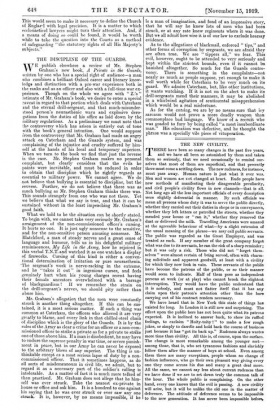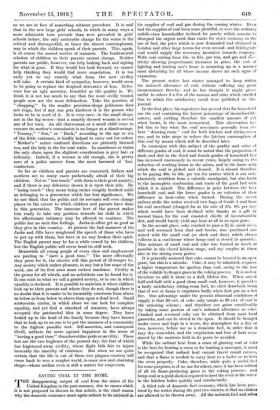THE NEW CIVILITY.
THERE have been so many changes in the past five years, and we have all been so astonished by them and taken them so seriously, that we need occasionally to remind our- selves that most of them are superficial, and that presently there must come a settling down. The new rudeness, for instance, must pass away. Human nature is just what it ever was. Men and women are not changed at heart. Rude people have new methods of manifesting their disagreeable peculiarity, and civil people's civility flows in new channels—that is all. Not long ago all the less important officials of every description were slightly deferential in manner. By such officials we mean all persons whose duty it was to serve the public directly, whether they carried out their duties in shops or in conveyances, whether they left letters or patrolled the streets, whether they mended your house or "ran it," whether they removed the dust or delivered the milk Travelling Americans were amazed at the agreeable behaviour of what—by a slight extension of the usual meaning of the phrase—we may call public servants. The public was regarded as the Great Employer, and was treated as such. If any member of the great company forgot what was due to its servants, he ran the risk of a sharp reminder ; but it was only a risk. Those who did not "forget them- selves" were almost certain of being served, often with charm- ing solicitude and apparent goodwill, at least with a civility for which they now look in vain. These servants of the publie have become the patrons of the public, or so their manner would seem to indicate. Half of them pose as independent persons at work (or at play) who cannot brook the slightest interruption. They would have the public understand that it is nobody, and must not flatter itself that it has any claim upon their patron's attention other than the bare carrying out of his contract renders necessary.
We have heard that in New York this state of things has existed for long. In London it is still new and surprising. The effect upon the public here has not been quite what its patrons expected. It is inclined to answer back, to show its ruffled feelings, to exclaim " Hoity-toity ! " to make a few rough jokes, or simply to dawdle and hold back the course of business just because it has "got its back up." Rudeness always wastes more time than civility. All this is, of course, upon the surface. The change is most remarkable among the younger sort— among those, that is, who set tyrannous fashions and slavishly follow them after the manner of boys at school Even among them there are many exceptions, people whom no change of fashion influences, who go their own pleasant way giving every one they come across his due and many a great deal more. All the same, we cannot say less about current rudeness than we have done if we are to set down truly the common talk of the hour. The whole public is complaining. On the other hand, every one knows that the evil is passing. A new civility will arise, but it will be unlike the old one in the matter of deference. The attitude of deference seems to be impossible to the new generation. It has never been impossible before,
so we are in face of something without precedent. It is said that in the new large girls' schools, in which in many ways a more admirable tone prevails than ever prevailed in girls' schools before, the only noticeable change for the worse is the critical and disrespectful, at times the almost contemptuous, way in which the children speak of their parents. This, again, is of course the merest matter of manners. The fundamental relation of children to their parents cannot change. Neither parents nor public, however, can help looking back and sighing for what is gone. If they would but look forward, we cannot help thinking they would find more consolation. It is too early yet to say exactly what form the new civility will take. A certain kind of sympathy, however, would seem to be going to replace the despised derivative of fear. Defer- ence has an ugly ancestry, beautiful as the quality is. We think it is not too much to say that the most civilly treated people now are the most defenceless. Take the question of "shopping." In the smaller provision-shops politeness does not reign, but if any one gets kindness it is the person who looks to be in need of it. It is very rare—in the small shops, not in the big stores—that a smartly dressed woman is served out of her turn. An old charwoman or a small child come to execute its mother's commission is no longer at a disadvantage. "Tommy," "Son," or Duck," according to the age or sex of the little customer, is kindly helped to carry out his orders. " Mother's " rather confused directions are patiently listened too, and the lady in the fur coat waits. In omnibuses or trains the only claim upon the slightest consideration is grey hair cr infirmity. Indeed, if a woman is old enough, she is pretty sure of a, polite answer from the most harassed of 'bus- conductors.
So far as children and parents are concerned, fathers and mothers are in many cases pathetically afraid of their big children. Not to "lose touch" with them is their great anxiety, and if there is any deference shown it is upon their side. By "losing touch" they mean being rather roughly brushed aside as belonging to a generation which has lost significance. We do not think that the public and its servants will ever change places to the extent to which children and parents have done in this generation. The immense love of the parent makes him ready to take any position towards his child in which his affectionate intimacy may be allowed to continue. The public has no such fine feelings. Jacks-in-office get as good as they give in this country. At present the bad manners of the Jacks and Jills have roughened the speech of those who have to put up with them, but have in no way broken their spirit. The English parent may be for a while cowed by his children, but the English public will never bend its stiff neck.
Meanwhile all young people of every class and employment are panting to "have a good time." The more effectually they press for it, the shorter will this period of ill-temper be. ' Any society which makes pleasure, in any but a low sense of the • word, one of its first aims must eschew insolence. Civility is the grease for all wheels, and no substitute can be found for it. It can exist in what we call a graded society, or in one in which equality is declared. It is possible to maintain it where children look up to their parents and where they do not, though there is no doubt that it is easier to be invariably courteous from above to below or from below to above than upon a dead level. Small aristocratic circles, in which alone we can look for complete equality, and yet find a standard of manners, have always accepted the patriarchal idea in some degree. They have looked up to the head of the familybecause they have known that to look up to no one is to put the manners of a community to the highest possible test. Self-assertion, and consequent illwill, militate far more against happiness in the sense of "having a good time" than does either pride or servility. These last are the two bugbears of the present day, the fear of which has frightened away civility, whose flight bids fair to injure incurably the amenity of existence. But when we are quite certain that the life is out of these two plagues courtesy will come back to woo a rougher world, in some new and charming shape—whose outline even is still a matter for conjecture.







































 Previous page
Previous page